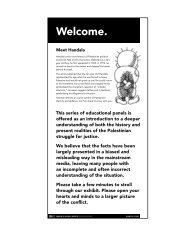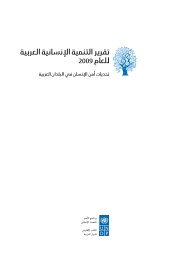arab human development report 2003 - Palestine Remembered
arab human development report 2003 - Palestine Remembered
arab human development report 2003 - Palestine Remembered
- No tags were found...
You also want an ePaper? Increase the reach of your titles
YUMPU automatically turns print PDFs into web optimized ePapers that Google loves.
CHAPTER 1Conceptual framework: knowledge, <strong>human</strong><strong>development</strong> and the knowledge society inArab countriesThis series of Arab Human DevelopmentReports (AHDR) was designed so that the firstissue, published in June 2002, offered a comprehensivetreatment of <strong>human</strong> <strong>development</strong>in Arab countries according to the definitionadopted by the series and recapitulated in PartI of this issue. Subsequent issues were to examine,in depth, specific challenges that are of essentialimportance to <strong>human</strong> <strong>development</strong> inthose countries. This practice starts with thissecond issue of the series, dedicated to thetopic of "knowledge".This chapter lays out the conceptual basisfor exploring issues of knowledge and defineswhat is meant by the "knowledge society".Subsequently, it discusses briefly some questionsraised as a result of contrasting the characteristicsof the "knowledge society" withthose of present-day Arab societies. Thesequestions, and the challenges they pose, will befurther tackled in subsequent chapters of thisReport. It ends by highlighting a major challengeto knowledge in Arab countries, namelythe need to create strong, effective and increasingsocietal demand for knowledge supportedby adequate purchasing power.WHY FOCUS ON KNOWLEDGE?Knowledge is recognised as a cornerstone of<strong>human</strong> <strong>development</strong>, a means of expandingpeople’s capabilities and choices and a tool forovercoming <strong>human</strong> poverty. In the 21st century,knowledge is also increasingly a dynamicfactor of production and a powerful driver ofproductivity and <strong>human</strong> capital. The firstAHDR identified a serious shortfall in knowledgeacquisition, absorption and use as one ofthree cardinal deficits undermining <strong>human</strong> <strong>development</strong>in Arab countries. This secondReport starts where the first left off and takesan in-depth look at the causes and consequencesof the relative backwardness of theArab region in this vital arena.The first AHDR highlighted how weakknowledge bases and stagnant knowledge <strong>development</strong>condemn many Arab countries tofragile productive power and reduced <strong>development</strong>opportunities. It is now a commonplacethat the knowledge gap, rather than the incomegap, determines the prospects of countries intoday’s world economy. In addition, a consensusis emerging that the gap between developingand developed countries in the capacity toproduce knowledge is wider than the knowledgegap itself. This calls for serious efforts toregenerate knowledge production in the developingworld.The Report assumes that countries with deficientknowledge capabilities have much togain by moving towards the "knowledge society"since the <strong>development</strong>al returns on knowledgeacquisition increase in societies suffering aknowledge deficit. Such societies can take advantageof the abundant stock of knowledge,experience and best practice available worldwide.They can learn from the mistakes andprofit from the achievements of early knowledgeleaders. In a comparative perspective, forArab countries, the need to invest in knowledgeis great and the dividends that can be realizedare proportionately large.BOX 1.1Edward W. Said - What knowledge?It isn’t knowledge as a product or commoditythat we need; nor is it a matter ofremedying the situation by having biggerlibraries, a greater number of terminals,computers and so forth, but aqualitatively different knowledge basedon understanding rather than on authority,uncritical repetition, mechanicalreproduction. It is not facts, but howFor Arab countries, theneed to invest inknowledge is greatand the dividends thatcan be realized areproportionately large.facts are connected to other facts, howthey are constructed, whether they relateto hypothesis or theory, how one isto judge the relationship between truthand interest, how to understand realityas history. These are only some of thecritical issues we face, which can besummed up in the phrase/question, howto think?CONCEPTUAL FRAMEWORK: KNOWLEDGE, HUMAN DEVELOPMENT AND THE KNOWLEDGE SOCIETY IN ARAB COUNTRIES 35







